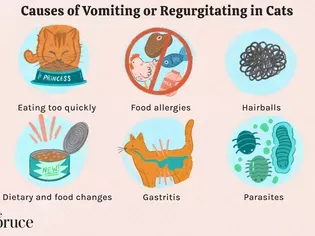Why Is My Cat Throwing Up Its Food?
Updated on 05/26/24

Why Is My Cat Throwing Up Its Food?
Introduction:
Feline vomiting is a common occurrence that can be caused by various factors. Understanding the underlying reasons is crucial for providing prompt and appropriate care for your furry friend. This comprehensive guide will delve into the potential causes of cat vomiting, providing actionable advice to alleviate the issue and restore your feline companion's health.
Common Causes of Cat Vomiting:
1. Dietary Indiscretions:
* Abrupt changes in diet
* Gorging on food too quickly
* Ingestion of spoiled or contaminated food
* Sensitivity to certain ingredients
2. Gastrointestinal Issues:
* Inflammatory bowel disease (IBD)
* Pancreatitis
* Intestinal parasites
* Gastritis
* Ulcers
3. Infections:
* Viral infections (e.g., feline panleukopenia)
* Bacterial infections (e.g., Salmonella)
* Feline leukemia virus (FeLV)
* Feline immunodeficiency virus (FIV)
4. Metabolic Disorders:
* Diabetes mellitus
* Hyperthyroidism
* Liver disease
* Kidney disease
5. Systemic Diseases:
* Cancer
* Toxoplasmosis
* Heatstroke
* Ingestion of toxic substances
6. Other Causes:
* Hairballs
* Stress or anxiety
* Motion sickness
* Foreign body ingestion
Determining the Cause:
Identifying the underlying cause of cat vomiting requires careful observation and veterinary consultation. Consider your cat's symptoms, including:
* Frequency and duration of vomiting
* Appearance of vomit (e.g., color, consistency)
* Other associated symptoms (e.g., diarrhea, lethargy)
* Your cat's age, breed, and overall health history
Treatment Options:
Treatment for cat vomiting depends on the underlying cause. Common approaches include:
* Dietary modifications (e.g., bland diet, elimination diet)
* Medications (e.g., anti-nausea, antibiotics)
* Surgery (in severe cases)
* Supportive care (e.g., hydration, electrolytes)
Home Remedies:
In some cases, minor cat vomiting can be managed at home. Consider the following remedies:
* Restrict food and water for 12-24 hours to allow the gastrointestinal tract to rest.
* Offer small amounts of bland food (e.g., boiled chicken, white rice) frequently.
* Add probiotics or pumpkin puree to support digestion.
* Provide plenty of fresh water to prevent dehydration.
Prevention:
Preventing cat vomiting is not always possible, but some measures can reduce the risk:
* Feed your cat a high-quality diet with consistent ingredients.
* Avoid sudden changes in diet.
* Encourage slow eating by using puzzle feeders or slow-feed bowls.
* Keep your cat away from spoiled or contaminated food.
* Regularly deworm and vaccinate your cat to prevent infections.
* Manage stress levels and provide a safe and comfortable environment.
When to Seek Veterinary Attention:
Seek veterinary attention promptly if your cat exhibits the following symptoms:
* Vomiting that persists for more than 24 hours
* Vomit that contains blood or bile
* Vomiting accompanied by lethargy, diarrhea, or loss of appetite
* Vomiting of a foreign body or toxic substance
* Kittens or senior cats vomiting
Conclusion:
Cat vomiting is a common issue with various potential causes. Understanding the underlying reasons and knowing when to seek veterinary assistance is crucial for maintaining your cat's health. By implementing preventive measures, addressing dietary indiscretions, and managing underlying medical conditions, you can help your furry friend live a happy and healthy life free from frequent vomiting. Remember, prevention and early intervention are key to ensuring the well-being of your feline companion.
Explore More Pets

Cat Behavior Problems
How to Stop Aggression in Kittens

Long-Haired Cat Breeds
Siberian Cat: Breed Profile, Characteristics, & Care

Cat Behavior Problems
How to Stop Kittens From Scratching and Biting

Long-Haired Cat Breeds
Turkish Angora: Cat Breed Profile, Characteristics & Care

Basic Training
How to Socialize Your Kitten

Short-Haired Cat Breeds
Cute Pictures & Facts About Calico Cats & Kittens

Litter Box Training
Training Your Kitten to Use the Litter Box

Long-Haired Cat Breeds
10 Fun Facts About White Cats
